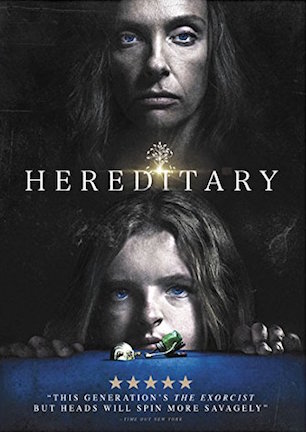Studio: A24
Director: Ari Aster
Writer: Ari Aster
Producer: Buddy Patrick, Kevin Frakes, Lars Knudsen
Stars: Toni Collette, Alex Wolff, Milly Shapiro, Mallory Bechtel, Ann Dowd, Gabriel Byrne
Review Score:
Summary:
A grieving mother’s secret ancestry connects her to a supernatural presence haunting her fractured family.
Review:
Around the time a séance took place midway through “Hereditary,” I had my first “Blair Witch Project” flashback. When the seminal “found footage” film opened in limited release in 1999, I entered a Los Angeles theater with buzz in my ear of the movie being among the most frightening experiences possible. Confused when my unimpressed reaction didn’t align with anticipation, I swiveled my head left and right as other patrons screamed and squirmed and I thought, “what are they seeing that I’m not?”
The same thing happened throughout the first hour of “Hereditary.” Following the film’s powerhouse debut at Sundance early in the year, genre media headlines started hailing it as the scariest movie of 2018. I’m now wise enough to not unfairly calibrate expectations based on acclaim, but I couldn’t help feel as though ballyhoo led me astray again. Here I was stifling yawns during the movie’s SXSW encore while my seat neighbors eagerly inched forward, audibly gasped, or shot hands toward their mouths in horror. Once more I had to wonder, “what are they seeing that I’m not?”
My perception shifted once “Hereditary” hit its homestretch. I then had my second “Blair Witch Project” flashback. Despite my overall disappointment with the 1999 movie, I had to admit that its final minutes were unnerving, and the infamous ending with Mike standing in a corner hauntingly burned a permanent imprint in my memory.
This is what happened with “Hereditary,” except on a far greater scale. As much as the first half lulled my pulse to a sleepy beat, the second half swirled me into its hypnotic horror of terrifying tableaus and nightmarish imagery.
“Hereditary” brings to mind Darren Aronofsky’s “mother!” (review here) only in the sense that kneejerk reactions may be superficially misleading. “Hereditary” retroactively improves the longer it sits with you, as it takes time for its insidiousness to steep. Had I written this review immediately afterward, or definitely during, my expressed impression might be one of muted indifference for the fact that the film’s conflicting energies initially cancel each other out.
As I’m instead writing this one week removed from the screening, I realize I can still see certain scenes with vivid clarity while simultaneously sensing the ripples of their aftershocks. It’s a bit like coming out of anesthesia and being unsure of exactly what happened while you were unconscious. Your body feels normal, yet something intangible suggests you may have been complicit in an odd occult ceremony whose summoned darkness still stirs somewhere in your soul.
That’s overselling “Hereditary” with hyperbole, but it begs to be described in terms of texture, because being cerebrally suggestive is how the film casts its sinister spell. Narratively, “Hereditary” isn’t steady enough with its tempo to be consistently satisfying from opening title to end credits. Yet it is undeniably effective in establishing eeriness through stylishly atmospheric craftsmanship.
The only smidge of story necessary to know is that tragedy forces Annie Graham’s struggling family to grieve the loss of two members within an unfortunately short period of time. Desperate efforts to seek solace take dark turns, luring Annie deeper into a demonic conspiracy tracing all the way back to the roots of her family tree.
Like “The Witch” (review here), “The Blackcoat’s Daughter” (review here), and virtually every one of A24’s genre releases before it, the auteur aesthetic building this world, coming courtesy of first time feature filmmaker Ari Aster, paces “Hereditary” to divide arthouse enthusiasts and horror purists with its slow burn suspense and symbolism. Metaphors are in play, though not to the extent that “Hereditary” becomes ambiguously interpretive. It works as a straight dramatic thriller even with its patiently meditative exploration of mourning, debilitating trauma, and pitiable people whose fates are determined by outside actions.
While the slow stride takes its time getting where it is going, the movie makes do in the meanwhile with emotionally explosive performances from Toni Collette, who is never less that entirely engrossing, and Alex Wolff, who impressively builds off the backbone of strong support provided in “My Friend Dahmer” (review here). Milly Shapiro, Gabriel Byrne, and Ann Dowd in particular are equally excellent, though their comparatively limited minutes ensure spotlights stay on Collette and Wolff.
With performances casting the line, Aster baits the hook using carefully chosen movements and edits. From where the camera is mounted to show a screeching tire to whose face is onscreen when someone else learns something devastating, cinematography writes a unique language for visually conveying a story. Long zooms and continuous takes demand sustained intensity, and it’s the committed cast who collectively keeps that ribbon tied tight.
Economics play a part in how shot selections mask a smaller scale production, but as with the smart sound design, such techniques trick the brain into filling in blanks regarding what is happening out of frame. This activates the recesses of a viewer’s mind to imagine grotesqueries perhaps more terrifying than what the film already shows you.
That subtle smolder whose flame flickers to the brink of extinguishing erects an early barrier for allowing “Hereditary” to envelop its audience. Fortunately, rescuers arrive in the form of Colin Stetson’s amazingly affecting score, a witchy discomfort on par with David Bruckner’s “The Ritual” (review here), and a “Rosemary’s Baby” on steroids finale not soon to be forgotten.
Let “Hereditary” gestate. Like it, loathe it, or fall anywhere in between, you’re likely to find its macabre mood lingering whether or not you personally wish to pick up what it puts down.
Review Score: 75






Although it takes forever to get there, invested audiences will still be hungry to chew on “The Housemaid’s” savory secret thanks to appealing performances.